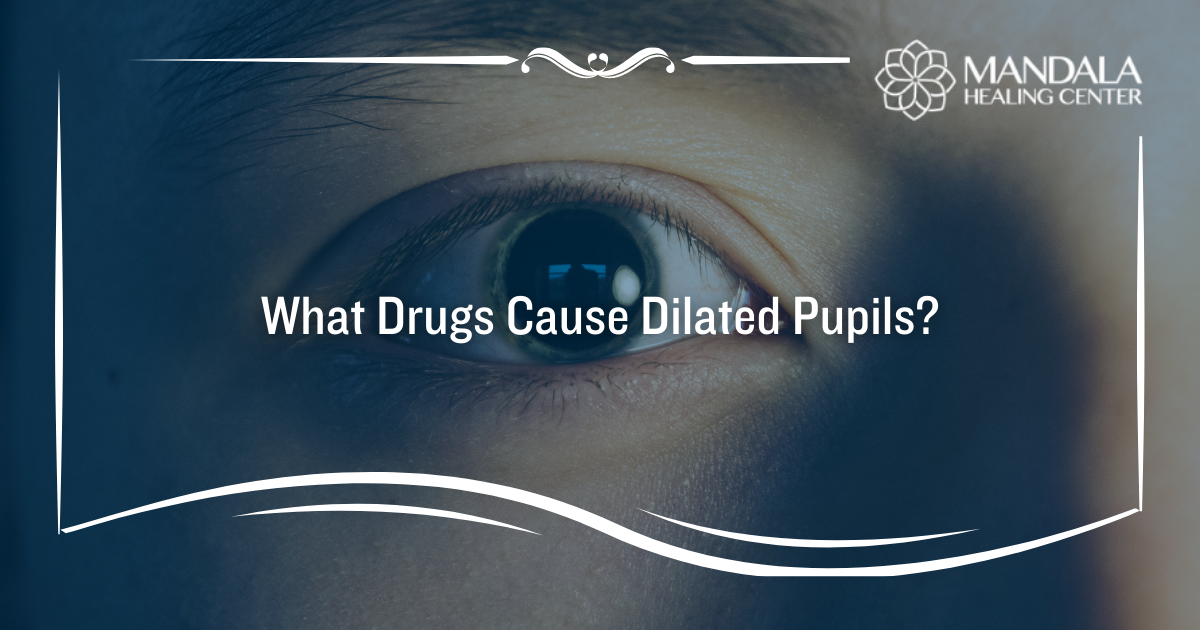According to the National Institutes of Health, 10% of Americans have suffered from drug addiction at some point in their lives.[1] Because substance abuse and addiction are so common, you probably know of at least one or two people who have or are currently suffering from a substance use disorder.
If you are worried that one of your loved ones is abusing substances, one of the easiest ways to tell is by looking at their eyes. Substance abuse can cause many different effects on a person’s eyes, including red eyes, watery eyes, and dilated or constricted pupils.
If you have noticed that your loved one’s pupils are abnormally large, they could be abusing drugs that cause pupil dilation. Being aware of which drugs cause dilated pupils can help you determine whether your loved one is suffering from addiction.
What Drugs Cause Dilated Pupils?
Dilation of the pupils is referred to as mydriasis.[2] This is when the iris (the black center of your eye) expands and widens, causing the pupil (the black part in the center of your eye) to appear larger than normal. Dilation occurs naturally when you are in a room with low lighting because it allows your eye to collect more light.
However, if someone’s eyes are dilated even in bright environments, something else might be going on. There are several reasons eyes may dilate, including as a response to trauma, illness, or the use of drugs.
The drugs that cause pupils to dilate include:
Stimulants
Stimulants are a class of drugs that speed up messages traveling between your brain and body. There are prescription and illicit stimulants, with both types being habit-forming and highly addictive. One of the telltale signs of stimulant abuse is large, dilated pupils.
Prescription stimulants that cause pupil dilation include:
- Adderall (amphetamine/dextroamphetamine)
- Ritalin and Concerta (methylphenidate)
- Dexedrine (dextroamphetamine)
- Vyvanse (lisdexamfetamine)
Illicit stimulant drugs that lead to enlarged pupils include:
If you notice that your loved one has dilated pupils, increased energy, and a decreased appetite, they may be abusing a stimulant drug. Stimulant drug addiction requires professional treatment that includes a combination of medical detox, evidence-based therapies, and relapse prevention planning.
Hallucinogens
Another class of drugs that are associated with dilated pupils is hallucinogens. Hallucinogens are a diverse class of drugs that alter a person’s perception, thoughts, and feelings. In other words, these substances can cause people to see and hear things that aren’t there while causing emotional effects like euphoria or anxiety.
Examples of hallucinogens that cause pupil dilation include:
- LSD
- Psilocybin mushrooms
- Mescaline
- Phencyclidine (PCP)
- Ketamine
- Dimethyltryptamine (DMT)
While you cannot become physically dependent on hallucinogenic drugs, it is possible to become psychologically addicted. If you notice that your loved one has dilated pupils, experiences hallucinations, and is frequently isolating themselves from friends and loved ones, they may be suffering from hallucinogenic drug abuse.
Benzodiazepines
Benzodiazepines are a class of drugs that are prescribed to treat anxiety, insomnia, and seizure disorders. All benzodiazepine drugs increase the effects of a neurotransmitter called gamma-aminobutyric acid (GABA), which can make you feel calm and drowsy. However, this can also lead to the dilation of your pupils.
Examples of benzodiazepines that cause mydriasis include:
- Alprazolam (Xanax)
- Chlordiazepoxide (Librium)
- Clorazepate (Tranxene)
- Diazepam (Valium)
- Halazepam (Paxipam)
- Lorazepam (Ativan)
- Oxazepam (Serax)
- Prazepam (Centrax)
- Quazepam (Doral)
When benzodiazepines are taken in excess, pupil dilation is common. If your loved one was taking benzodiazepines as prescribed by a doctor, it is unlikely that their pupils will become enlarged.
Antidepressants
Lastly, some antidepressant medications are known to cause pupil dilation. These medications are non-habit forming, which means you cannot become addicted to them. If your loved one takes antidepressant medication, pupil dilation may not be indicative of substance abuse.
There are two different types of antidepressant medications known to cause pupil dilation, including selective serotonin reuptake inhibitors (SSRIs) and tricyclic antidepressants (TCAs).
Examples of SSRIs that cause pupil enlargement include:
- Citalopram (Celexa)
- Escitalopram (Lexapro)
- Fluoxetine (Prozac)
- Paroxetine (Paxil, Pexeva)
- Sertraline (Zoloft)
Examples of tricyclic antidepressants associated with pupil dilation include:
- Amitriptyline (Elavil)
- Clomipramine (Anafranil)
- Doxepin (Sinequan)
- Imipramine (Tofranil)
- Trimipramine (Surmontil)
- Desipramine (Norpramin)
- Nortriptyline (Pamelor, Aventyl)
- Protriptyline (Vivactil)
If your loved one has dilated pupils and is currently taking antidepressant medication, they might not be suffering from addiction. Antidepressant medications like SSRIs and TCAs are non-habit forming and not known as drugs of abuse. If the only symptom your loved one is displaying is pupil dilation, they might just be taking medication for depression or anxiety.
Find Help for Substance Abuse and Addiction Today
If your loved one frequently has dilated pupils and is displaying additional signs of substance abuse, they could be suffering from addiction. Drug addiction is a chronic and progressive disease that must be treated within a professional drug and alcohol rehab facility. Mandala Healing Center can provide your loved one with all of the tools and support they need to recover from addiction.
To learn more about our highly-rated drug rehab program in West Palm Beach, FL, contact Mandala Healing Center today.
References:
- https://www.nih.gov/news-events/news-releases/10-percent-us-adults-have-drug-use-disorder-some-point-their-lives
- https://www.sciencedirect.com/topics/medicine-and-dentistry/mydriasis












